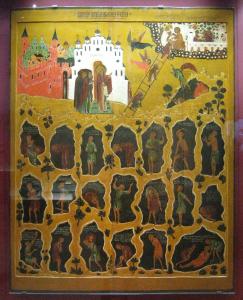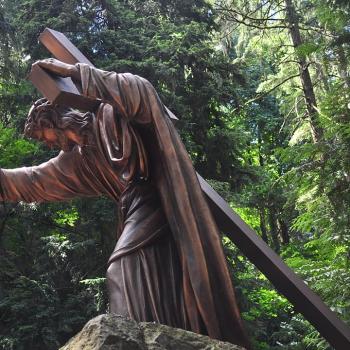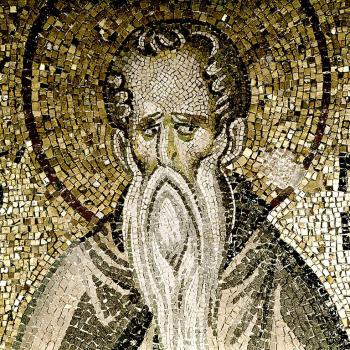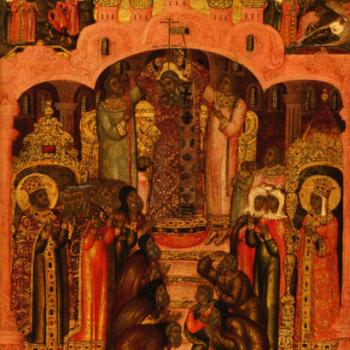
Jacob’s Ladder And Christ
Scripture tells a story of Jacob having a dream in which he saw a ladder that made its way to heaven; on it he saw angels going up and down, that is coming and going between heaven and earth. It was not an ordinary dream, but one inspired by God, given to him to help present to Jacob various truths, truths which he (and others) should discern as they try to interpret the meaning of the dream. Jews and Christians alike have found many possible messages, many possible ways to interpret the dream, and they believe that many of them can be intended simultaneously, complementing each other. For Christians, one of the most important interpretations of the dream is to see the ladder as a representation of the incarnate God-man Jesus Christ, because in and through him, heaven and earth have been made one. If he is the ladder, that means, he gives us the means to attain the kingdom of God, but also, it means we must do our part and “climb the ladder,” making sure we do not commit some sort of misstep and fall (perhaps to our doom). This notion inspired St. John Climacus, who, writing for monks at Mount Sinai, suggested that their spiritual path was to involve many stages, with each stage represented by a rung on the ladder. What he wrote, The Ladder of Divine Ascent, became a popular work, read not just by monks, but by laity who believed they could adapt the wisdom in it and apply it in some fashion to their lives. It was due, in part, to its popularity that the Byzantine tradition would establish the fourth Sunday of Lent as St. John Climacus Sunday. As Lent is a time in which the spirit of asceticism is encouraged not only for monks, but for everyone, the Ladder suggests various ascetical practices and labors we can use to help inspire us to become better persons; however, it is imperative that those who are not monks follow the spirit, and not the letter, of the text, as the work was written for specific monks with a specific context in mind. Perhaps one of the most important points of the work is the way it reminds us that our path towards the kingdom of God will not likely be instantaneous, but rather, will be done in many stages, and so we should not give up when we find ourselves at a stage far away from the destination we seek.
Not As Unwise Men But As Wise
It is, of course, important to remember we cannot make the journey all by ourselves, that is, without any help. We cannot make our way to heaven except through the way heaven and earth have been joined together in Christ. Similarly, we need God’s grace to give us the strength to carry on, for the journey is long and difficult, and without grace, we would find it impossible: we would eventually stumble, and not get back up. As we are often shown during Lent our need for metanoia and conversion, we must not forget that such conversion opens us up to grace, the grace which we need to engage if we want to transcend ourselves and become someone better, and greater than we are today. During Lent, we are encouraged to do this by taking on an ascetical approach, that is, by disciplining ourselves so that we can resist our worst instincts. We must expose the darkness within ourselves, all the to our unconsciousness, for by doing so, we will be able to dispel it. Thus, St. Paul tells us to: “Take no part in the unfruitful works of darkness, but instead expose them” (Eph. 5:11 RSV). We are to do our part to expose the darkness within, and then to do what we can to walk in the light, doing as God would have us do: “Look carefully then how you walk, not as unwise men but as wise, making the most of the time, because the days are evil. Therefore do not be foolish, but understand what the will of the Lord is” (Eph. 5:15-17 RSV).
The will of the Lord, the will of Christ, is presented to us in the Sermon on the Mount; we are to be humble, not proud; we are to be working for peace, not creating unnecessary conflicts; we are to be merciful, even as we seek after and desire justice in the world:
Blessed are the poor in spirit, for theirs is the kingdom of heaven. Blessed are those who mourn, for they shall be comforted. Blessed are the meek, for they shall inherit the earth. Blessed are those who hunger and thirst for righteousness, for they shall be satisfied. “Blessed are the merciful, for they shall obtain mercy. “Blessed are the pure in heart, for they shall see God. Blessed are the peacemakers, for they shall be called sons of God. Blessed are those who are persecuted for righteousness’ sake, for theirs is the kingdom of heaven. Blessed are you when men revile you and persecute you and utter all kinds of evil against you falsely on my account. Rejoice and be glad, for your reward is great in heaven, for so men persecuted the prophets who were before you (Matt. 5:3-12 RSV).
Using The Ladder Which Has Been Given
We are called to be holy, not with a false holiness, seeking to glorify ourselves with all kinds of external acts of piety, but with a true holiness, a holiness that makes us like God, merciful and loving, promoting the establishment of justice in the world. We are to fight our worst inclinations, our worst passions, which, if we let them have total control of us, would lead us astray, acting not only against the expectations of justice but the greater expectations of love. The more we thirst for righteousness, the more we will work on our own personal defects, doing what we can to overcome them. The more we thirst for righteousness, the more we will realize we can’t achieve it all by ourselves. We need help, we need grace, the grace which is given to us in Christ Jesus, the God-man, who in himself, we find heaven and earth are joined together. The rungs of the divine ladder are the works of love which Jesus said we would fulfill if we love him; if we are not careful, if we ignore the expectations of love, we can try to rise up, we can try to become holy, but we will find we will eventually stumble and fall, which is something St. John Climacus warned his readers in his work. It is his exhortations, his wisdom, which transcends the letter of his text, which makes it worthy for us to remember St. John Climacus during Lent. We should keep in mind his message, that, we are, throughout our lives, called to make our way to heaven, to ascend using the ladder which has been given, by following the particular walk of life God has given us to have.
Stay in touch! Like A Little Bit of Nothing on Facebook.
If you liked what you read, please consider sharing it with your friends and family!
N.B.: While I read comments to moderate them, I rarely respond to them. If I don’t respond to your comment directly, don’t assume I am unthankful for it. I appreciate it. But I want readers to feel free to ask questions, and hopefully, dialogue with each other. I have shared what I wanted to say, though some responses will get a brief reply by me, or, if I find it interesting and something I can engage fully, as the foundation for another post. I have had many posts inspired or improved upon thanks to my readers.

















